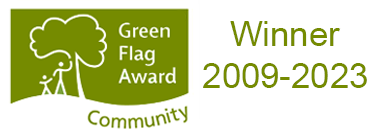23 members present. No apologies received
Chairman Norman Clyde-Watson welcomed members to the meeting.
**Notices
- Green Pennant Award. Now known as the Green Flag Community Award. Norman and John had shown the judges around the Ridge and all had gone well. The results are expected in July.
- Thicket Clearance - Some areas of thicket had been cleared or reduced. This has allowed plants to grow and has improved the safety of the area by reducing the cover near some paths.
- Graffiti - Some graffiti on fences had been removed thanks to the efforts of Norman and John.
Norman then introduced Paul Summers, who is head of Environment at Broxtowe BC and is responsible for Refuse Collection, Parks and Open spaces, Street Cleaning and Transport. Paul gave a very interesting illustrated talk on 'Waste Disposal in Broxtowe' with comparisons to other areas in Notts. He presented many facts and some are listed below.
Broxtowe Borough - comprises of 111,500 residents and around 40,00 households, which each produce approximately 1 tonne of rubbish per year. It costs around 90 pence per collection and 43% of rubbish is recycled - 7,700 tonnes of paper, 6,000 tonnes of garden waste and 2,600 tonnes of glass. The remainder is incinerated at Eastcroft where steam turbines produce electricity for the National Grid and also provide district heating to Victoria Centre, Broadmarsh Centre and 33,000 homes.
The primary aim of waste disposal is to protect Public Health and is governed by many Acts of Parliament. The council only have a duty to remove domestic waste but will remove other items at a small cost.
Human waste is taken to Stoke Bardolph, where energy is produced from gas to treat water. The treated waste is used as fertiliser on fields to grow maize, which is then fed to pigs, which are then fed to humans.
Dog and clinical waste are both incinerated at high temperature at Eastcroft.
Broxtowe puts very little waste into landfills, but outlying areas do. This is currently taxed at £47 per tonne.
Some more facts:-
- Glass is recycled with macadam and made into material for road building
- Clothing and paper are sold on to the rag and paper trades
- Plastics are mainly recycled
- Garden waste is taken to a composting centre near Sheffield
- Wooden furniture is made into wood chip and paper products
All of the above generate income for the council, but do incur costs in transporting from homes to the recycling facilities.
Broxtowe has 17 vehicles which cost approx £110,000 each and need replacing every 3-4 years. They only do around 2 miles per gallon of diesel. There are 47 staff employed in waste collection and disposal, and the overall budget is £2m per year
Paul stressed that education is an important activity, especially in schools.
One the whole Broxtowe rates well in recycling efforts and other facilities such as Bring Banks and Glass Banks help to generate income and increase the overall level of recycling.
Paul then answered numerous questions, and Norman thanked him for his informative talk.
Note - the next work group is on Sunday 5 June at 10:30am
The meeting closed at 9:15pm
The Friends are always looking for extra pairs of hands to help out or to simply support their work, so...
- to find out when the next work session will take place, click here, or
- to find out about becoming a member please contact us here, or
- to discover what goes into managing the sites click here.
